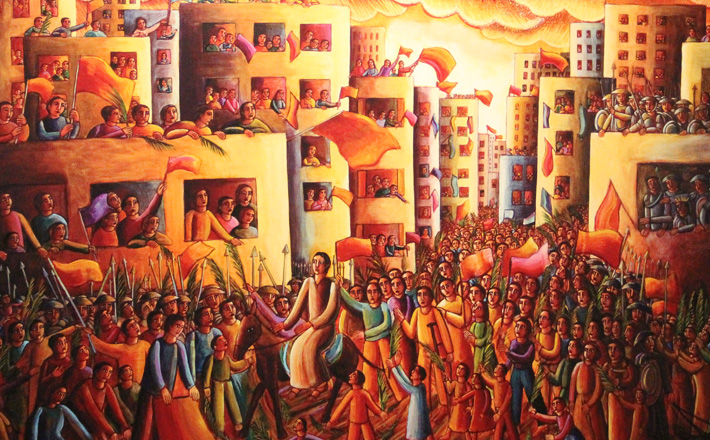Commentary on Philippians 2:5-11
Paul was first and foremost a pastoral theologian.
His preoccupation was for the spread of the gospel, but principally through the vitality of the communities of believers scattered through the Roman world. That was the lens through which he looked when he reflected on the story of Christ’s death and resurrection: what does that twinned event of crucifixion/resurrection have to say about our life together?
Paul is writing to a congregation precious to him, to folks who have supported him and his ministry, even to his present situation in prison (1:12-14). With good reason they are concerned for his safety and survival, since many people did not survive Roman prisons. Their concern, though, was more than just personal concern about the possible loss of a friend. The Greek term koinōnia (1:5; 2:1; 3:10), translated in the NRSV as “sharing,” is actually a term found in Roman commercial law. The meaning is like the English word “partnership,” and the legal provision was that if any party to the partnership were to die, the entire enterprise would be dissolved. The danger that Paul (or his companions Timothy or Epaphroditus; see 2:19-30) might die, threatened the whole ministry in Philippi.
The fact that commercial law figures in the Philippians’ framework for understanding life, including the community of believers, suggests that they are a community of some means. Economic poverty does not seem to be an issue in Philippi, as it was in so many others of the communities where Paul’s churches were located. The Christians in Philippi were, however, suffering at the hands of “opponents” (1:27-30), and had been for some time. Two women in the congregation, Euodia and Syntyche, are apparently at odds (4:2-3), and their disagreements are affecting the rest of the congregation. In other words, economic well-being notwithstanding, they were suffering. In order to guide them through this difficult time, Paul includes the hymn that is today’s lection.
The carefully constructed parallelism of verses 6-11 establishes it as a poem or a hymn. There is no way to know whether Paul himself was the poet who composed it, or whether like many African American preachers, he incorporated a well known and beloved hymn of the congregation into his own message. That hymn sets forth the “Christ-mindedness” Paul commends to them to see them through the difficult time (2:5). That “mindedness” and consequent actions had two movements (verses. 6-7c; 7d-8); and they were followed by a glorious response from God (verses 9-11).
The two movements in verses 6-11 trace Christ’s journey into human life, then through that life to death on a cross. Though that journey involved “emptying himself” of power and status (kenosis), it is not the journey of a victim of someone else’s oppressive policies or actions. Rather, it is a path freely chosen from a position of power. Christ begins in God’s “form” and equal to God. This is more than an affirmation that Jesus of Nazareth, like every human being, is in the image of God. Here he is on a par with God, equal to God, just as he takes on “human form” (verse 7d) and becomes fully human. Instead of remaining in his initial place of power, or trading it for a human role of honor and prestige, he lives as the lowliest of human beings, a slave, and accepts the form of execution reserved for slaves, namely death on a cross (verse 8).
This embodied “Christ-mindedness” took Christ and would take the Philippians on a path contrary to the wisdom of the world in which they operated. Competition and the effort to acquire ever greater status and power rule the world of commerce, and from there the rest of our social interactions as well. One does not deliberately choose a downward spiral for one’s life. Indeed, success is often taken by people of faith to indicate that God is rewarding their diligence, and failure is often read by the same logic as the consequence of laziness, ineptitude, or the just punishment for some wrong done. We identify more readily with the theology of Job’s friends than with a theology of God’s abundant grace!
This hymn, though, identifies such humble obedience and kenosis as the reason for God’s exuberance and response described in the last half of the hymn (verses 9-11). The same Jesus who has abandoned the safety and status of equality with God to follow the path just described is given a new name–“Lord” (verse 11)–that is also the name of God. Every aspect of the creation will recognize that name with appropriate honor and accolades, and in that praise God will be glorified.
This lection turns the dial on our lens, to give us a new focus through which to perceive and understand the horrendous events of Jesus’ passion. It is not the story of Jesus as victim, nor is it a one-time event that can remain safely in the remembered past. Rather, it is a narrative of freely chosen obedience that models for us how to live faithfully in the communities where out lives are cast. Paul invites us to make it our story as well.


March 28, 2010